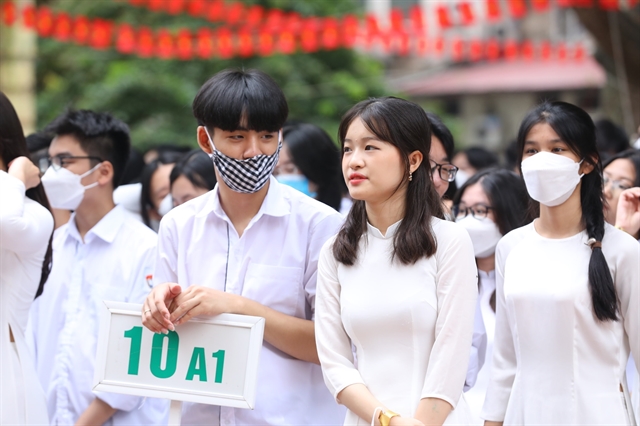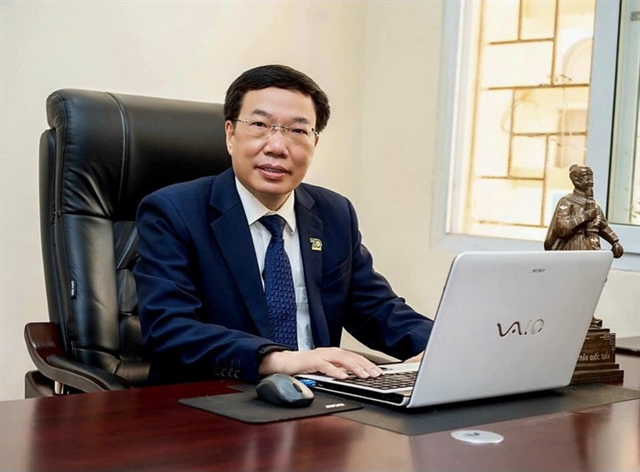 Society
Society

 |
| Dr Vũ Văn Tiến, principal of the High School for the Gifted at Hà Nội National University of Education. — Photo courtesy of Dr Vũ Văn Tiến |
Dr Vũ Văn Tiến, an educationist and principal of the High School for the Gifted at Hà Nội National University of Education, was honoured in June 2024 with the prestigious title of "Outstanding Teacher" by the President, recognising his significant contributions to education. Tiến talks with Việt Nam News on his journey, the inspirations that led him to teaching, and the values that continue to guide him.
You were awarded the title "Outstanding Teacher", one of the most prestigious accolades in education in June this year. What does this title mean to you personally?
The title "Outstanding Teacher" is a great honour from the State, awarded to teachers, administrators, and researchers who make significant contributions to education. For me, this title recognises my 36 years of dedication to teaching and educational development. It fills me with joy, pride, and motivation to keep contributing to the field.
Teaching is a noble yet challenging profession. Could you share what initially inspired you to pursue a career in education?
I completed high school in 1983, a time when students could apply to only one university, college, or vocational school. Coming from a rural background, our exposure to career options was limited, and vocational guidance was minimal.
Most students didn’t have a clear sense of career paths. I did well in secondary and high school, especially in science, and teachers often asked me to demonstrate solutions on the board.
When it came time for university, a few friends and I chose the Hà Nội University of Education. Entry was very competitive, but I was fortunate to pass on my first attempt. I completed four years of study and began teaching immediately after graduating in June 1987. Becoming a teacher felt natural—almost like a calling.
You’ve been in the profession for a long time and mentored many students. Is there a particular memory from your career that stands out?
Over my 37 years in education, I’ve had many joyful and challenging experiences with different generations of students.
One memory I’ll never forget was on Teachers Day, on November 20, 1988. A group of students came to my home early with a few guavas from their garden as a gift. They expressed admiration and respect, even though they knew I didn’t remember their name because they struggled academically.
Teachers often remember high-achieving students, but this “profound lesson” taught me that every student is unique. As teachers, we must care for, encourage, and treat all students equally, regardless of their academic performance.
Many students remember you as kind and approachable. How do you balance the strictness required of a headmaster with approachability?
The longer I work in education, the more I realise that teaching is an incredibly challenging job. As the head of the school, I need to maintain strictness and fairness, but I also try to listen and understand my students’ aspirations and concerns.
I spend time speaking with them and offering guidance on personal issues. My goal is to be a strict yet approachable headmaster, someone students can see as a mentor and a friend when needed.
At the High School for the Gifted, many teachers excel at this balance. Some are so beloved by students that they are “idolised”. Our school strives to create a rigorous yet compassionate environment—a “humanistic” culture that helps students shape their character and prepares them for the demands of modern society.
Based on your experience, what are the essential qualities of an excellent teacher?
Throughout my 37-year career, including 16 as vice-principal and then principal, I’ve continued to teach because I consider it my “primary profession”. To be an excellent teacher, you need strong subject knowledge, effective classroom management, and, most importantly, a passion for teaching and love for students.
Success isn’t guaranteed by subject mastery alone. The same lesson might resonate well with one class but fail to engage another. Teaching is about “nurturing people” and “teaching people how to live”. Before imparting knowledge, teachers must build trust and inspire students to see the value of learning.
Our school recruits students from across the country, each with different backgrounds and personalities. Every teacher here understands the importance of “infusing life” into each lesson, adapting to various types of students, and making each lesson fresh and engaging.
You’ve managed both personal and school responsibilities over the years. What motivates you to keep leading the school to success despite the challenges?
Whether teaching or managing, I always put students at the centre, prioritising their interests above all else. Looking into my students’ innocent, eager eyes makes worldly worries fade away. Balancing multiple tasks is challenging, requiring harmony and focus on solutions.
In teaching, my focus is on students; in management, it’s on encouraging others, sharing joys and challenges with colleagues, and working together to fulfil our school’s mission.
Over your career, you have achieved a lot in both teaching and administration. As a seasoned educator, do you have any advice for young people considering a career in education?
Teaching today is much more convenient than when we first graduated, but choosing a career is harder now due to the abundance of information. For those who choose to become teachers, the first step is to love the job, people, and especially children.
Teachers should be empathetic, encourage students in difficult times, and find joy in their students' progress, however small. They should feel concerned when students lose interest or struggle.
A teacher, whether in classroom or in life, must be an exemplary figure, living as a model for students to follow. VNS




